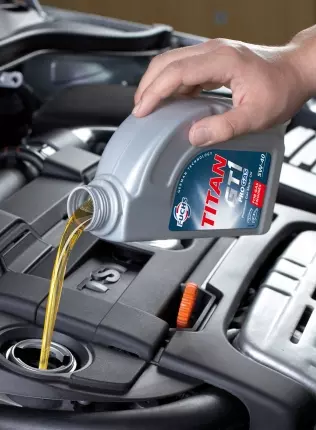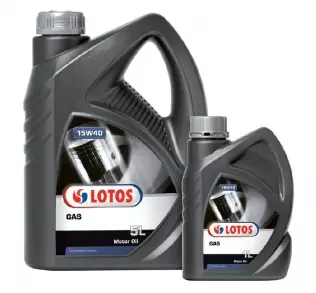- Main page
- Search
- Up to date
- Products
- Technology
- Vehicles
- Video
- Conversion Payback Simulator
Port Injection - Conversion Payback Simulator
Direct Injection - Conversion Payback Simulator
Diesel - Newsletter
Oil for gas engines
 loading results...
loading results... © FuchsTitan GT1 Progas 5W-40 oil is dedicated to LPG- and CNG-powered engines in passenger cars. Unfortunately, it’s not available in Poland
© FuchsTitan GT1 Progas 5W-40 oil is dedicated to LPG- and CNG-powered engines in passenger cars. Unfortunately, it’s not available in PolandIncreasingly stringent emission requirements mean that one of the few possibilities to meet them is decreasing the dimensions of main engines. The size of drive unit is reduced and this directly affects oil tanks’ capacity, so a smaller amount of engine oil must meet the increasing demands of drive units.
It is also expected that oil will reduce the engine’s own output resistance (lower fuel consumption and emission). This leads manufacturers to use low-viscosity oils, the so-called easy-rolling oils. On the other hand, car users expect to visit car service stations less often, which makes the gaps between successive oil replacements longer. This puts very high demands on engine oil. Car manufacturers, when developing their quality requirements, expect strictly defined parameters to be met. If we add switching to gas supply, we might discover that the high requirements for modern day engine oil are often conflicting.
LPG is very popular in Poland, so various aspects of supplying engines with gas should be well known. Unfortunately, this knowledge is not widespread, particularly when it comes to lubricating such engines.
It has become quite common to think, even in the oil industry, that the caption “for gas” on oil packages is purely a marketing ploy. Maybe it was so in some cases, but information that we presently possess indicate that oils for LPG-powered engines should have slightly different properties than those used for petrol-fueled engines.
 © FuchsVirtually all Polish oil manufacturers offer oil lubricants for engines fueled with LPG. Since they’re present in the Polish market only, they can’t ignore over 2.8 million of potential customers
© FuchsVirtually all Polish oil manufacturers offer oil lubricants for engines fueled with LPG. Since they’re present in the Polish market only, they can’t ignore over 2.8 million of potential customersLPG-powered engines
Engines in passenger cars use LPG as alternative fuel (petrol is used as base fuel), so we should make sure that there are appropriate parameters of engine oil for both types of fuel.
Although drive units powered by LPG have been present on the market for many years, so far no regulations have been created that would specify the requirements for oil parameters relevant for such engines. Engine oils available on the market, dedicated to LPG-powered engines, are a proof that there is market for such products. These oils are specified on the basis of universal quality and viscosity standards, and each manufacturer interprets the parameters essential for gas-powered engines in their own way.
Gas fuel is in many ways more friendly for engine oil than petrol. First of all, lubricant film is not washed off the cylinder bearing surface – especially when the engine is in the process of reaching its thermal equilibrium – so the associated process of engine oil dilution caused by fuel that penetrates into the oil sump does not occur. Thus, oil does not change its viscosity, neither is it degraded through being diluted by fuel. The tendency to form high-temperature deposits (carbon deposits) in combustion chambers is also lower.
Parameters of engine oil used for lubrication of LPG-powered engines are influenced mostly by working temperature, which is higher than in petrol-powered engines. This increase in temperature is primarily due to the properties of gaseous fuel and the necessity to provide greater excess air number. Increased thermal load in gas-powered engines is also the effect of the lack of intake valves cooling, present in petrol engines. Sprayed petrol remains in the liquid state and by having contact with the valves, it cools them down (especially the intake valves). In addition, the combustion of gas-air mixture is slower, which means that the walls of the combustion chamber are exposed to high temperatures for a longer time (as compared to petrol). Increased temperature in combustion chambers also results in increased average engine temperature, which can lead to higher oil consumption. Another factor that may contribute to higher temperature in the combustion chambers is inaccurate LPG dosing carried out by gas supply systems of the first and second generation. These, however, are already giving way to gas injection systems (fourth generation) that are characterized by very high dosage precision. Blend depletion may cause temperatures in the engine to go up. This may result in increased amount of silt depositions and reduce the effectiveness of anti-corrosion additives.
 © LotosLotos Gas mineral oil is one of many lubricants available on the Polish market for engines fueled with LPG
© LotosLotos Gas mineral oil is one of many lubricants available on the Polish market for engines fueled with LPGHigh temperatures also translate into more rapid oxidation and other degradation processes of engine oil. Oil oxidation is especially strong in thin layers, e.g. cylinder liners or plain bearings (bushes). Exceeding the gaps between engine oil changes may lead in such conditions to weakening the bearing capacity of lubricant film and the solution of its continuity. It will cause accelerated wear of the honed layer, thereby further reducing its ability to keep the lubricant film. This results in increased wear of cylinder liner and associated increased consumption of engine oil.
Hot exhaust gases also have negative effect on hot engine oil. Oil’s washing and dispersing properties are degraded and acidic substances appear, which may cause corrosion of engine components. Washing and dispersing additives, aimed at neutralizing these substances, wear fast. In consequence, oil’s base number decreases.
Oils for LPG-powered engines are also expected – apart from reducing friction between cooperating engine components – to maximize the durability while maintaining the expected properties throughout the periods between oil changes. Engine oil cannot negatively affect the level of harmful emissions, also in terms of sustainability of catalytic exhaust gas after-treatment systems.
Achieving those properties requires the use of base oils with lower natural tendency to oxidation. That’s why synthetic bases are used more and more frequently, supplemented with additives that level the above-mentioned processes occurring in gas-powered engines. Among those additives, there must be more effective oxidation inhibitors than in petrol, washing and dispersing additives optimized for LPG but providing a low sulfated ash content – which is required in SI engines (petrol) – appropriate corrosion inhibitors, viscosity modifiers, as well as anti-wear and lubricity additives.
Cracow Oil and Gas Institute has significant experience in research and evaluation of the quality of engine oils. Since early 90s, the Institute has cooperated with refineries, doing research on lubricants used in automotive industry. As a part of this collaboration, research was conducted on the behavior of engine oil in LPG-powered vehicles. The study was performed in order to determine what changes occur in engine oil of a gas-powered drive unit. Experience gained through this research may be used to develop oil formulations that would be more effective in gas-powered vehicles, because – as previously stated – there are no special quality requirements for this type of product.

You may also find these interesting:
 loading results...
loading results...








